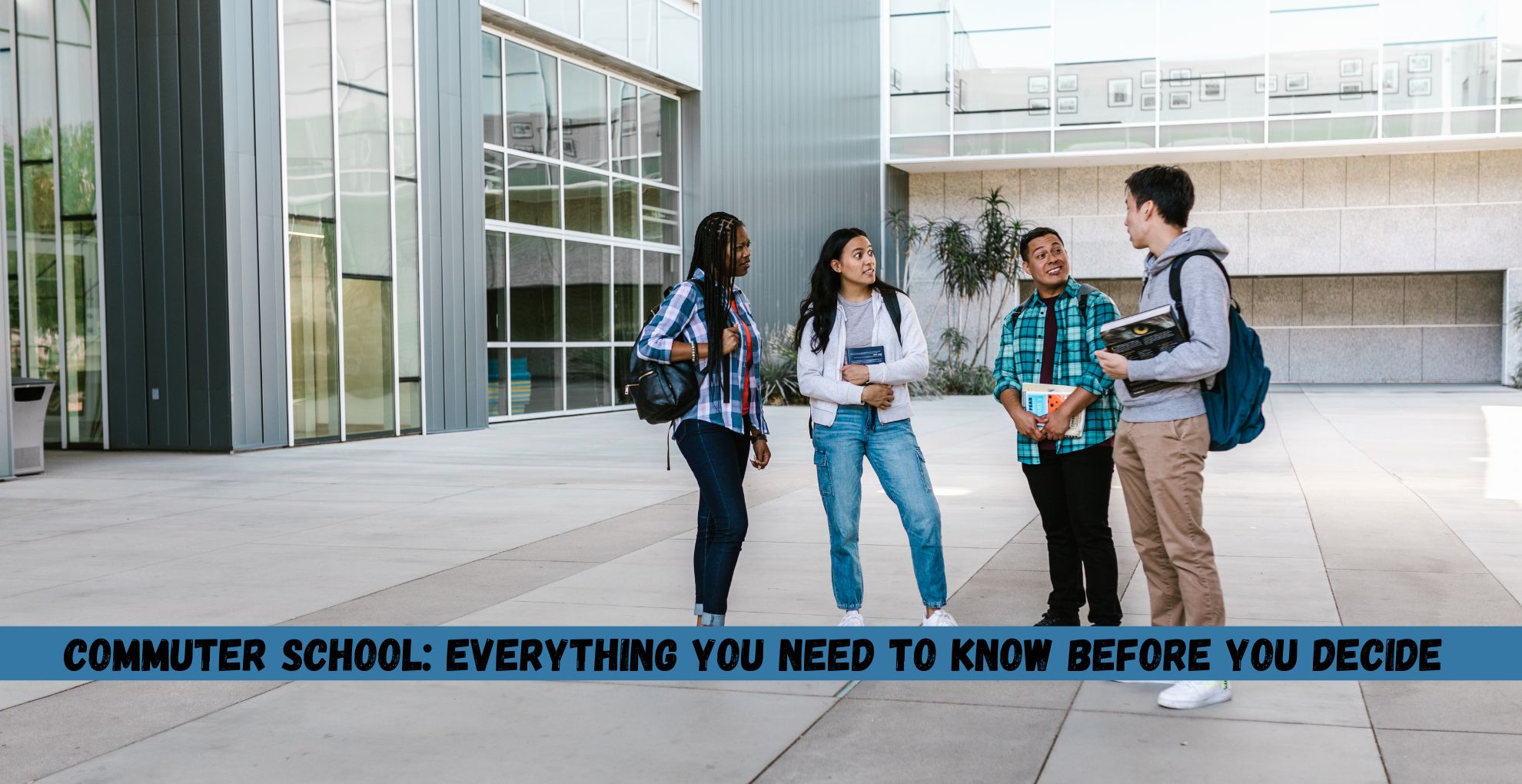College is a major milestone, and for many, the traditional route means moving into a dorm and living on campus. But that path doesn’t fit everyone. A growing number of students are choosing a commuter school experience—attending college while living off-campus and commuting from home.
Maybe you’re juggling a part-time job, caring for a family member, or simply trying to avoid massive student loan debt. If any of that sounds like you, commuting might just be the perfect balance between academics, life, and budget. In this guide, we’ll break down what a commuter school is, explore the real pros and cons, share personal insights, and give you tips to make the most of your experience.
What Is a Commuter School?
A college or university that has a high percentage of students who do not live on campus is known as a commuter school. Rather, they commute daily, usually from home or a nearby apartment, to and from school. Many of their students have obligations outside of college, such as work or family duties; therefore, these institutions usually feature little to no on-campus accommodation.
California State University, Northridge, the University of Houston, and George Mason University are a few examples of commuter universities. These universities are reputable and have excellent academic programs, even though they might not place as much emphasis on campus life.

Why Choose a Commuter School?
For students who value flexibility, affordability, and family support, a commuter school can be a game-changer.
Saving Serious Money
One of the biggest reasons students choose to commute is cost. Campus housing in the U.S. can average over $10,000 per year. Living at home or in affordable off-campus housing can drastically cut that down. Add in savings on meal plans and dorm supplies, and you could avoid thousands in debt.
Staying Close to Home
Living at home can mean emotional stability, especially for those dealing with anxiety, family health issues, or cultural expectations. Some students simply aren’t ready to leave their support system behind. And that’s okay.
Carrie Gilmore, a student at Manhattan College, shares:
“I spend all day at school, but I get to come home to a hot meal and my family. Sure, it takes planning, but it’s worth it.”
Balancing Life and School
Many commuter school students are working professionals, parents, or caregivers. Being able to fit college into your daily routine without uprooting your life can make higher education possible when it might otherwise be out of reach.
The Ups and Downs of Commuting to College
No college path is perfect, and commuting comes with both perks and trade-offs.
The Perks
- More independence over your schedule. Want to study at your favorite café or catch a late-night shift? Go for it.
- Privacy and space. Dorm life isn’t for everyone. Living off-campus gives you more control over your environment.
- Wider social circle. You’re not limited to campus-based relationships. Local communities, jobs, and events are all part of your network.
The Challenges
- Less campus immersion. You might miss out on spontaneous late-night pizza runs or dorm bonding sessions.
- Commute stress. Traffic, weather, and transportation issues can add daily frustration.
- Time management hurdles. You’ll need to plan every day, from classes to lunch to parking.
Is Commuting the Right Fit for You?
Before committing to a commuter school, ask yourself some important questions.
- How far is too far? Experts recommend a commute under an hour each way to avoid burnout.
- Do I have a productive space at home? Distractions like noisy siblings or a lack of privacy can impact your academic success.
- Can I stay motivated without being on campus? Staying focused and engaged requires intentional effort.
If you’re unsure, try doing a few trial commutes at the same times your classes would start. See how it feels—are you drained before you even get there? Or does it fit seamlessly into your day?

How to Thrive at a Commuter School
Succeeding as a commuter takes a bit more intention, but it’s doable with the right mindset and strategy.
Make Your Campus Hours Count
Plan to stay on campus between classes rather than going home and coming back. Use that time to study in the library, grab coffee with classmates, or attend events.
Join Clubs and Social Groups
Many commuter school students find it harder to form friendships, but it doesn’t have to be that way. Joining clubs, intramurals, or campus jobs can help you build strong connections.
Even something as simple as attending orientation or volunteering at campus events can create opportunities to meet people and feel more connected.
Prep Like a Pro
- Keep snacks and water in your car or bag. Long commutes + long classes = hungry students.
- Pack a charger, headphones, and study materials. Think of your bag like a mobile study center.
- Invest in a reliable parking pass. Trust us—circling for 20 minutes before class is not how you want to start your day.
Smart Tips to Make Commuting Easier
- Time your commute wisely. Avoid rush hour by scheduling classes mid-morning or in blocks.
- Use the commute productively. Listen to lectures, audiobooks, or podcasts. If you’re on public transport, read or review flashcards.
- Stay organized. Use digital planners or apps to map out your weekly schedule. Include commute times, club meetings, and work shifts.
What If Commuting Isn’t Working?
Even the most motivated commuter school student might face burnout. If the schedule or lifestyle becomes overwhelming, consider these alternatives:
Online Courses or Hybrid Learning
More colleges now offer online options that allow for flexibility while still earning your degree from an accredited institution.
In-State Public Universities
If your commute is based on financial need, look into affordable public universities that offer in-state tuition. Some even allow students to live off-campus while accessing more robust campus services.
Certificate and Bootcamp Programs
Short-term programs focused on specific skills—like coding or business analytics—might align better with your career goals and life schedule.
Real-Life Perspective: What Students Say
Being a commuter isn’t always glamorous, but for many, it’s the key to unlocking their future without unnecessary debt.
One student shared,
“My mornings start with an hour-long drive, but I’ve learned to love the routine. It gives me time to think, prep for the day, and even catch up on my favorite podcasts. Plus, I’m graduating debt-free—and that’s priceless.”
This kind of balance between academics, home life, and career aspirations is exactly what makes the commuter school path valuable for so many.

Frequently Asked Questions About Commuter Schools
Are community colleges and commuter schools the same?
Not exactly. Most community colleges are commuter schools, but many four-year universities also serve a commuter population. The term refers more to the lifestyle than the institutional type.
Do commuter students get less financial aid?
Sometimes. Living at home can lower your estimated cost of attendance, which could reduce need-based aid. Always check with your school’s financial aid office.
Can I commute to a non-commuter school?
Yes! Many traditional universities allow students to live off-campus. Just be aware that you might feel a bit left out if most students live in dorms.
How can I make friends if I don’t live on campus?
Make intentional time for socializing—join a club, study in shared spaces, or even host weekend hangouts. Connection takes effort, but it’s worth it.
How far is too far to commute?
Most experts recommend no more than an hour each way. Anything more could negatively impact your energy, attendance, and grades.
Final Thoughts
Choosing to attend a commuter school isn’t about settling—it’s about smart decision-making. Whether you’re looking to save money, stay close to home, or simply create your path, commuting gives you the chance to take control of your education on your terms.
It might take a little more planning, a little more hustle, and a lot of time on the road—but for many, it’s worth every mile.




